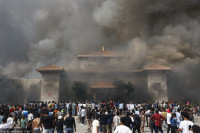Kathmandu
Pashupatinath is the richest shrine in the country, but it has stinking toilets that nobody wants to use
The Pashupati Development Trust had brought 23 portable toilets two months ago to facilitate the public, but they are sitting idle at the office’s premises, helping no one..jpg&w=900&height=601)
Anup Ojha
Ashok Thapaliya, an artist who has been sketching human portraits on the premises of Pashupatinath Temple for the past decade, never uses the public toilets constructed by Pashupati Area Development Trust in the area. They are filthy and do not even have running water, he says.
Instead, Thapaliya goes to the nearby jungle in Mirgasthali to relieve himself. Or to his friend's house in Gaushala, if time allows.
“It’s because none of the toilets have running water. They also emit an unpleasant odour,” he says. Like Thapaliya, hundreds of pilgrims and visitors face this problem in Pashupatinath every day.
Two months ago, the Trust had brought 23 portable toilets to operate on its premises, but these toilets are sitting idle—being exposed to rainwater and sun, gathering dust. Neither has the Trust been able to provide better facilities to the public, nor has it been able to utilise the toilets it has already purchased.
The Trust is the richest shrine in the Kathmandu Valley in terms of property. According to a report made public by a committee formed to study the assets of Pashupatinath on June 6, the temple alone has Rs1.2 billion cash, 9.276kg gold, 316,58 kg silver and 3,667 ropanis of registered land.
Despite its reserves, the Trust has been unable to properly manage the five free latrine facilities it operates on its premises.
When the Post contacted Ramesh Upreti, executive officer at the Trust, to inquire about the toilets, he said that the mobile toilets will come into operation from Sunday. “We could not operate these mobile toilets as our donors had not handed them over to us officially. From Sunday onwards, however, the public can use them,” said Upreti.
This, however, is not the first time the Trust has confirmed the operation of the portable toilets. Prem Hari Dhungana, information officer at the Trust, had confirmed to the Post a month ago that the toilets would come into operation in the Pashupati area from the first week of June.
Upreti instead blames the general public’s irresponsible behaviour for the current state of the toilets inside Pashupatinath.
“Pashupatinath is an open museum. Anyone can get in, but not everyone who comes in takes responsibility for their actions. People use the toilet and then don’t flush; they let water-tap open,” said Upreti. “Once we install these mobile latrines, we will be deploying additional officials to monitor them. The officials will also be cleaning the existing toilets,” said Upreti. He added that as these mobile toilets have an auto-flush system, it will be easier to manage and keep the toilets clean, even during festivals such as Shivaratri, Teej, and Bala Chaturdashi, when thousands of devotees visit Pashupati.
Among the 23 portable toilets, 19 units were brought from China and four were brought from India. The cost of each unit of box toilet is Rs 107,500. The toilets are being handed to the trust by Everest Bank and NIC Asia Bank.
What do you think?
Dear reader, we’d like to hear from you. We regularly publish letters to the editor on contemporary issues or direct responses to something the Post has recently published. Please send your letters to [email protected] with "Letter to the Editor" in the subject line. Please include your name, location, and a contact address so one of our editors can reach out to you.




 20.12°C Kathmandu
20.12°C Kathmandu.jpg)










